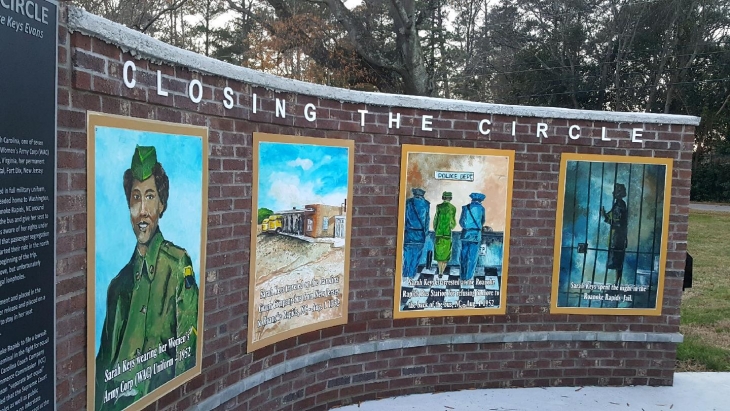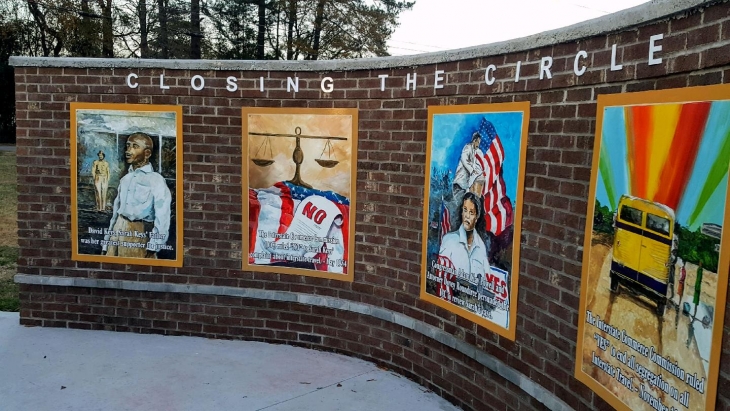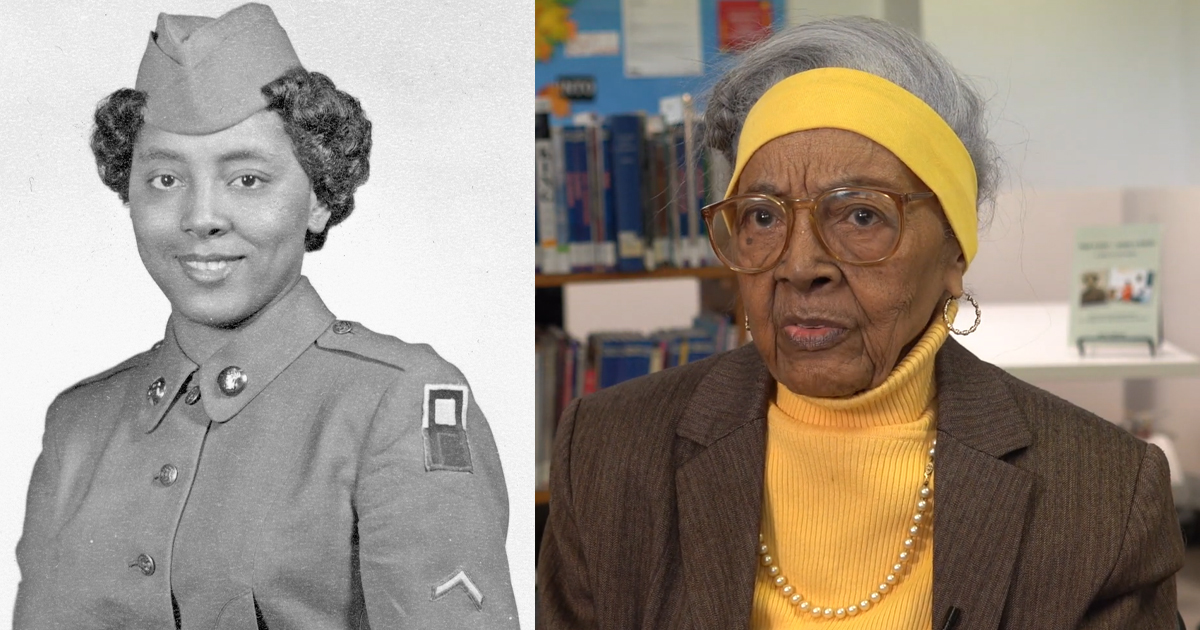Nearly 70 years ago, an Army Veteran’s stand against racial injustice changed interstate transportation.
Sarah Keys was a young, Black soldier serving at Fort Dix, New Jersey. She traveled on her way home to Washington, North Carolina, Aug. 1, 1952.
“I boarded this bus to take my first journey home after entry in the military,” she said.
A ticket leads to troubles
She bought a direct ticket to make sure she had no changes. At the time, buses in the South were segregated. However, a 1946 law declared buses originating in the North did not have to follow Southern laws.
But several hours later, after pulling into Roanoke Rapids, North Carolina, the bus changed drivers. The driver ordered the young Army soldier to the back of the bus. She refused to give up her seat. The driver collected every ticket on the bus – except one.
The bus driver then ordered everyone off the bus. Keys went to the bus station to get a ticket.
“When I got to the ticket window, the lady behind the curtain in the ticket window pulled down the curtain and dimmed the lights,” she said. Keys turned around to find a janitor sarcastically asking if she knew where she was – a perceived reference to being in the South.
“I said to myself, ‘Oh God, Sarah, you’re in trouble,’” she remembered.
Keys went back outside and asked the driver again if there was a problem with a ticket. A few feet away, police asked the driver if Keys was the unruly passenger he mentioned. He confirmed she was, so the police then took her into custody.
A night in jail
For the next 13 hours, law enforcement held Keys, placing her in a jail cell.
A dirty mattress, one she described as “dirtier than any you see discarded on the street,” was in the cell. Rather than soil her neatly pressed Army dress uniform, Keys paced the floor all night long.
The jailer came the next morning to bring her in front of the chief of police. Evans received a $25 fine for disorderly conduct.

The first of two panels from the “Closing the Circle” exhibit highlighting Army Veteran Sarah Keys Evans’ struggle.
Highlighting her fight
For years, her story went under the radar even though her trip was more than three years before Rosa Parks would stage her bus boycott. In fact, Parks’ boycott came six days after the Interstate Commerce Commission publicly announced the ruling in Keys’ favor. Attorney General Robert F. Kennedy later used the Keys case to call on the ICC to ban Jim Crow laws in interstate travel following the Freedom Rides.
“I’m a native and I didn’t know,” said Dr. Georgette Kimball, a retired 42-year educator who was part of a project team who brought her story to light. “She made a difference. It’s a piece of history that needs to be known.”
In August 2020, Keys’ fight was finally brought to a tangible reminder with the “Closing the Circle” display at Sarah Keys Evans Plaza in Roanoke Rapids. The plaza uses her married name.
Over a period of several years, people dug into the story and realized the impact the Army Veteran had made on interstate travel. Dr. Charles McCollum Sr., a retired educator and pastor of two Baptist churches, said the Southern Christian Leadership Conference banquet honored Keys Evans, which helped spread the story. From there, the team worked with the Z. Smith Reynolds Foundation for a public art initiative.
Eastern Carolina Christian College & Seminary received a foundation grant to bring awareness to her legacy. The plaza includes eight chronological mural panels and two bronze plaques mounted on two semi-circular brick walls. The plaza, located in Dr. Martin Luther King Jr. Park, shows her struggle and tells a story in a public forum.
“Her courage was so great,” said Dr. Ervin V. Griffin Sr., president emeritus of Halifax Community College. “I don’t know if I could’ve done it. That’s why she’s a trailblazer.”

The second of two panels from the “Closing the Circle” exhibit highlighting Army Veteran Sarah Keys Evans’ struggle.
Today
Keys Evans, now 92, lives in New York. She has not returned to Roanoke Rapids in the nearly 70 years since that night, instead joining the unveiling virtually.
Despite a later ruling, she never received her money back, said Ophelia Goulz-Faison, who researched Keys Evans’ struggle. She’s still out the $25 – about $250 in today’s value.
Despite being part of a landmark decision that changed American transportation, the Army Veteran said she doesn’t want the story lost.
“I’d like to be remembered as someone who helped somebody along the way,” Keys Evans said.
Learn more
Take the virtual tour: https://sarahkevansproject.com/virtualtour/.
Read more Black History Month stories: https://news.va.gov/?s=black+history+month.
Topics in this story
More Stories
Summer Sports Clinic is a rehabilitative and educational sporting event for eligible Veterans with a range of disabilities.
Report examines the input of over 7,000 women Veterans: They are happier with VA health care than ever before.
Veterans and caregivers, you can help shape the future eligibility requirements for the VA Caregiver Support program.







In 1943, my parents lived in Oklahoma and went by bus to visit my father’s family in Texas. On the way home, the bus driver stopped a black soldier from boarding before the whites. The soldier said, this was the 4th bus I had been kept off of and if he couldn’t board, he would be AWOL. My dad stepped up and announced, ‘If this soldier does not board, nobody does.’ The soldier made it back to base on time.
Here’s to you, Mrs. Keys Evans; you are iconic and legendary!
I am from Eastern North Carolina, so I find this enlightening on many levels. Honor and respect is long overdue and well deserved. I plan to visit this site this year. Thank you for being part of the change; you made a difference, Mrs. Keys Evans. It may not seem like a lot but thank you Dr. Kimball and those who took the time to share this story with the world.
When it comes to people of color and history, there are truly too many wonders, strengths, truths and overdue honors that have been neglected for far too long….
Our government/country should never hide these important messages from our schools/general public! I’m 76 years old just seeing this story, which reminds me how ignorant/cruel we treated people in the United States of America! We must continue to remind Americans of the cruelty put on individuals! If we allow our past cruelties placed on people of color/nationalities we will lose our country to a horrific history!
America’s history is truly shameful. Stories like Sarah Keys’ help shed light on these realities and bring hope for our future. No veteran should have ever experienced this.
With her simple words: “I’m perfectly comfortable right here where I am” in response to a bus driver’s demand that she move to the back of the coach because of her skin color – Ms. Keys displayed the courage and respect, that not only every military service personnel deserves, but that any human being should receive.
I’m in awe of this brave woman for the honorable and powerful example she represents in the long struggle for equality in America.
Sarah Keys Evans – from one veteran to another. God bless you and reward you for doing what’s right. Thank you
Veteran Keys Evans is to be honored for having the courage to continue in trying times. We are not yet done in over coming prejudice. I am confronted almost daily with the phrase African American for Negro. When I first heard the term “African American” I wondered why that region was being announced? And when, sometime later, I heard that the “N word” was considered derogatory I wondered how a specific race could be considered wrong. Mongolia, Caucasian and Negroid are all names of our human race. How can one of these be wrong and the others acceptable. When I heard the reference to the “N” word I thought it was referring to “N*****r” which is derogatory but, I don’t believe Negro is derogatory. It is a specific race.
I remember in school learning about George Washington Carver and the respect he earned. No one then had any animosity towards him then and they should not have any now!
And, calling one black who is really brown is defeating the reason for referring to one who is just different not bad or disgraceful. We need to get to the level of respecting all people and not think one segment of the population is lower than the other. I have a problem accepting that a Negro has to be referred to as a person from a region of the world rather than as a segment of human race. Black and African American are not precise so they should not be used for Negro. Let’s respect the folks who are Negro and not be ashamed of their nationality or race!
I salute you for standing your ground Ma’am. Thank you for your service to our country and your contribution of courage in our continuous struggle for equality!
Thank you for your service in the US ARMY. You are a true AMERICAN HERO!!
Thank you Mrs. Evans. Please KNOW your actions helped along the way even though it cost you the anguish you surely endured.
God Bless YOU!
Thanks to those who published this story to remind us all!
Bless you all! All people were blessed by the actions of Sarah Keys and the work of those that share her story. Glad she was courageous enough to do right. Sorry she had to. As a retired US Army vet, thank you.
I spent 20yrs in the Military and thought I had it rough. I no longer have anything to complain about..Glad I read your story..Thank you for being a strong Black Woman and paving the way for others like me to follow. May the Good Lord continue to Bless and keep you.
Glad to finally hear a true historical story of a nice young soldier over coming struggles of the day in the deep south. When I was new to the service, a friend and I went off base to see the town of Gulfport, MS. While off base in Gulfport, we found a cafe close to the corner of Highway 90 and 49 and went in to order a burger. The waitress came up to us (we were the only customers in this large cafe), she said, ” I can serve you but I cannot serve him.” -as she pointed in his direction. It was early 1966 and I was not thinking about segregation still being a Jim Crow thing from the past.
We had a choice. I could order two burgers and give him one or we could leave. I left the choice to my friend and we left without incident. It sure pissed me off. We took a bus ride back to the base and went into a mess hall to get some good food for free. I have retired to private life and my wife and I have revisited the old south. I’m glad to report no discrimination as moronic as this goes on anymore. in 1969, Hurricane Camille destroyed that cafe. I was not unhappy to see that bad memory had disappeared from the face of the Earth. Absolutely true story S/Sgt Terrell
First of all Thank You Mrs. Keys Evans for your service to our Country even through the ignorance of the day. Your name will be remembered forever in the continuing fight for equality for all. THANK YOU! ! ! ! ! !
Thank You Ma’am…
Thank You❤
The struggles of Africa-Americans has been long and hard, The bravery and selfless service and dedication of the forefathers and ancestor bring hope to generations, yet the fight continues. I want to thank all those who stood tall in the face of adversity to trailblaze and embark change. Mrs. Keys Evans is truly a Hero and I am proud to call her my Sister in Arms, my battle buddy, and role-model. Let us all strive for peace, justice and love.
I want to thank Veteran Keys Evans for her dedication and her outstanding mitary service. She is a role model for all of us fighting for equality and human dignity. She deserves much more for her courageous contributions to the military and USA. Thank you Veterans’Affairs for sharing this enlightening story.
Good work Kimball team. Being caged while traveling brings back memories to a small county in Texas circa 2009. I will never forget when a young inhabitant of that county said to me “We always go to jail here. That’s how it is.” Special thanks for NOT retroactively turning Keys into an African American. Not doing so really indicates your deep depth of knowledge. Thank you.